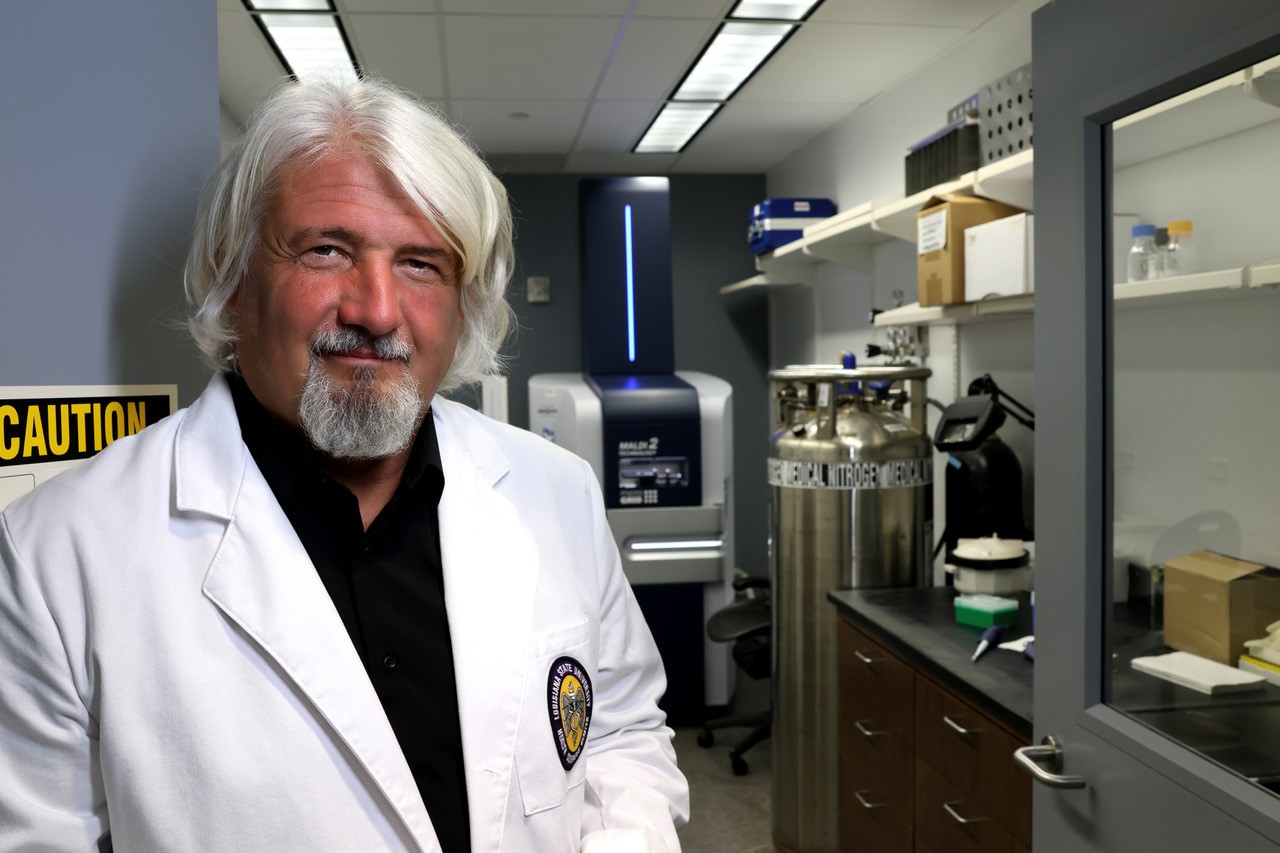How Blood Samples Are Changing Cancer Research: Dr. Jiri Adamec’s Research on Blood Sampling
August 21, 2023
Cancer Research in Minority Populations With Dr. Jovanny Zabaleta
Lab Profiles: Dr. Luis Del Valle’s Research on JC Polyomavirus and Brain Tumors
Kaposi Sarcoma Research at LSU LCMC Health Cancer Center With Dr. Charles Wood and Dr. John West
The Center for Translational Viral Oncology (CTVO) at LSU LCMC Health Cancer Center

Your blood is a window into your overall health. It can provide information on how healthy you are, give insight into how well your organs are working, and even help detect cancer. Because of this, blood tests are common in routine healthcare as well as a part of managing health conditions, including cancer.
But blood tests are also expensive — and oftentimes inconvenient. They require patients to visit a healthcare provider’s office or lab to have blood drawn. Then, blood must be stored properly in order to keep the sample usable. If all of these steps are completed, blood can be analyzed — but only with expensive equipment in a controlled environment.
Whether due to distance, lack of insurance, limited time, or wariness of healthcare systems, some patients never get this crucial piece of information about their health. What’s more, this important data is never collected by researchers, leaving a view of healthcare that is incomplete.
Dr. Jiri Adamec, Professor of Interdisciplinary Oncology and Director of Proteomics and Metabolomics Core laboratories at LSU LCMC Health Cancer Center, is on a mission to address this problem. Instead of finding ways to get patients to clinics or expensive equipment to patients, he’s building a bridge between the two — the plasma separation card.
Using Biomarkers and the Plasma Separation Card to Detect Cancer
Biomarkers are molecules in your body that can be found in your blood, tissue, and other body fluids. They can indicate disease, such as cancer, and show how well treatments are working.
Dr. Adamec and his collaborators — including Dr. Omeed Moaven, Dr. John T. West, Dr. Charlie Wood, Dr. Joseph Francis, Dr. Augusto Ochoa, Dr. Krzysztof Reiss, Dr. Scott Delacroix, and Eileen T. Mederos, RN — have dedicated their research to identifying biomarkers that could act as early signs of cancer and neurodegenerative diseases. While these biomarkers would not be a guaranteed diagnosis, they can be a factor in capturing a picture of a person’s overall health and determining if further testing needs to be done.
To analyze biomarkers, blood samples need to be collected. However, patients who face geographical, financial, or other barriers aren’t able to get this crucial snapshot of their health. In response to this need, Dr. Adamec is developing a system that collects, stores, and analyzes blood samples from remote areas using a plasma separation card.
While the cards look simple, they are highly functional. A few drops of blood are taken at home and placed on the card, which separates the plasma from the blood in just 3 minutes. Once separated, the samples are stabilized and can be transported anywhere to be analyzed for health conditions, including cancer.
“If we cannot bring the people to the instruments, we can bring the samples to the instruments,” says Dr. Adamec. “Everyone can do this at home, and the result is that we have an exact volume of the plasma in those discs that is dried and stable to control analysis.”
How Blood Samples Are Improving Cancer Care
Where people live is a major barrier to accessing care. Whether they’re in the remote areas of the Amazon or rural areas of the US, getting to a healthcare facility can be difficult if not impossible. Using plasma separation cards, all they need is access to a mailbox.
Other barriers to care include lack of insurance, wariness of the healthcare system, and time — all of which can be addressed through the plasma separation card. Patients would never have to step foot in a healthcare facility, but they would still have access to lifesaving care by catching signs of cancer early.
“If you have cancer in its later stages, it’s much more expensive to treat,” he explains. “This kind of prediction could be life-changing.”
In addition to helping patients understand their own health, the option to collect mass amounts of data could revolutionize cancer research. Currently, researchers have limited information about people who live in rural areas, are uninsured, or distrust healthcare. “Nobody actually knows exactly how these people are affected because they do not regularly visit a doctor,” Dr. Adamec explains.
By gathering blood samples from more people — whether their names are attached or the samples are collected anonymously — researchers would be able to personalize medicine, including cancer prevention and treatment.
The Future of Dr. Adamec’s Research
The plasma separation card has already shown promising results. Now, the focus is on gathering the right data from these blood samples.
To do this, it will require using a tool called mass spectrometry, which analyzes the chemical properties of molecules (which cells are made of). Dr. Adamec’s goal is to develop a system to simultaneously analyze thousands of targets from just a small amount of plasma. This would provide a mass amount of data about a person’s health in just 10 seconds or less.
While in its early stages, this technology is not far from being a reliable way to test blood samples using blood from plasma separation cards. With that, the ability to test thousands of patients — no matter where they live or what kind of insurance they have — will become an effective way to treat cancer and advance cancer research for everyone.
